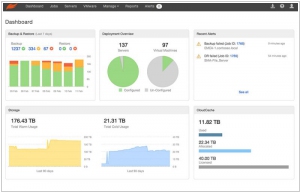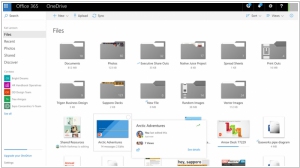Druva vs OneDrive
August 26, 2023 | Author: Michael Stromann
Druva and OneDrive are both cloud-based file storage and data protection solutions, but they have some key differences:
Focus and Use Case: Druva is primarily focused on cloud-based data protection, backup, and disaster recovery, with features that cater to the needs of enterprise customers for data protection and governance across endpoints, cloud applications, and data centers. OneDrive, on the other hand, is a file hosting and sharing service that is part of the larger Microsoft Office 365 suite, primarily designed for collaboration and file storage within the Microsoft ecosystem.
Data Protection and Backup Capabilities: Druva offers comprehensive data protection and backup capabilities for various types of data, including endpoints (laptops, desktops, mobile devices), cloud applications (such as Microsoft Office 365, Google Workspace), and data centers (servers, VMs). Druva provides features such as automated backup, versioning, deduplication, encryption, and global search across all backed-up data. OneDrive, on the other hand, primarily focuses on file-level backup and versioning for files stored within the OneDrive cloud storage service.
Scalability and Deployment Options: Druva is typically targeted towards enterprise customers and provides scalability for large-scale data protection and backup requirements, with options for on-premises and cloud-based deployments. Druva also offers data center backup and disaster recovery solutions. OneDrive is part of the Microsoft Office 365 suite and is tightly integrated with other Microsoft cloud services, making it suitable for businesses already using or planning to use Microsoft Office 365.
Collaboration and Sharing Features: OneDrive places a strong emphasis on file collaboration and sharing, with features such as real-time co-authoring, version history, comments, and integration with Microsoft Teams for team collaboration. OneDrive is also designed to work seamlessly with other Microsoft Office applications, such as Word, Excel, and PowerPoint. Druva, on the other hand, is primarily focused on data protection and backup and may not provide the same level of collaboration and sharing features as OneDrive.
Pricing and Licensing: Pricing and licensing models for Druva and OneDrive may vary, and it's important to review the specific offerings and pricing structures for each solution. Druva typically follows a subscription-based pricing model based on usage and features, while OneDrive is typically included as part of the Microsoft Office 365 subscription for business users.
In summary, the main differences between Druva and OneDrive include the focus and use case, data protection and backup capabilities, scalability and deployment options, collaboration and sharing features, and pricing and licensing. Businesses should carefully evaluate their specific requirements for data protection, collaboration, and file storage when comparing and selecting between these two solutions.
See also: Top 10 Online Backup services
Focus and Use Case: Druva is primarily focused on cloud-based data protection, backup, and disaster recovery, with features that cater to the needs of enterprise customers for data protection and governance across endpoints, cloud applications, and data centers. OneDrive, on the other hand, is a file hosting and sharing service that is part of the larger Microsoft Office 365 suite, primarily designed for collaboration and file storage within the Microsoft ecosystem.
Data Protection and Backup Capabilities: Druva offers comprehensive data protection and backup capabilities for various types of data, including endpoints (laptops, desktops, mobile devices), cloud applications (such as Microsoft Office 365, Google Workspace), and data centers (servers, VMs). Druva provides features such as automated backup, versioning, deduplication, encryption, and global search across all backed-up data. OneDrive, on the other hand, primarily focuses on file-level backup and versioning for files stored within the OneDrive cloud storage service.
Scalability and Deployment Options: Druva is typically targeted towards enterprise customers and provides scalability for large-scale data protection and backup requirements, with options for on-premises and cloud-based deployments. Druva also offers data center backup and disaster recovery solutions. OneDrive is part of the Microsoft Office 365 suite and is tightly integrated with other Microsoft cloud services, making it suitable for businesses already using or planning to use Microsoft Office 365.
Collaboration and Sharing Features: OneDrive places a strong emphasis on file collaboration and sharing, with features such as real-time co-authoring, version history, comments, and integration with Microsoft Teams for team collaboration. OneDrive is also designed to work seamlessly with other Microsoft Office applications, such as Word, Excel, and PowerPoint. Druva, on the other hand, is primarily focused on data protection and backup and may not provide the same level of collaboration and sharing features as OneDrive.
Pricing and Licensing: Pricing and licensing models for Druva and OneDrive may vary, and it's important to review the specific offerings and pricing structures for each solution. Druva typically follows a subscription-based pricing model based on usage and features, while OneDrive is typically included as part of the Microsoft Office 365 subscription for business users.
In summary, the main differences between Druva and OneDrive include the focus and use case, data protection and backup capabilities, scalability and deployment options, collaboration and sharing features, and pricing and licensing. Businesses should carefully evaluate their specific requirements for data protection, collaboration, and file storage when comparing and selecting between these two solutions.
See also: Top 10 Online Backup services
Druva vs OneDrive in our news:
2021. Online Backup service Druva raises $147M
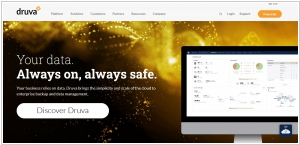
Announcing the closure of a $147 million funding round at a valuation exceeding $2 billion, Druva specializes in offering cloud data backup services. Earlier this month, the official announcement was made regarding the partnership between Dell and Druva, a collaboration that was initially reported in January of this year. The alliance with Dell positions Druva with a substantial customer base to target for future sales opportunities. This strategic move has the potential to significantly bolster the growth of the company, solidifying its position as a prominent player in the industry.
2018. Microsoft added AI transcription to OneDrive and SharePoint

Microsoft is introducing video and audio transcription capabilities to OneDrive for Business and SharePoint, enhancing the accessibility of various digital content for users. This new feature utilizes AI technology from Microsoft Stream (previously known as Office 365 Video) to automatically generate a complete transcript of dialogues when viewing videos or listening to audio files. The resulting text data will be stored in the Microsoft Cloud, offering cost-effectiveness and enhanced security compared to relying on external transcription tools. Office 365 subscribers can expect to access this new service later in the year.
2017. Cloud data management startup Druva raised $80M
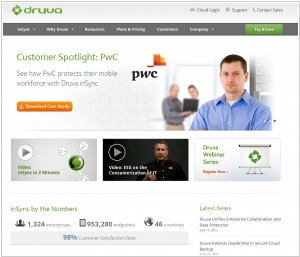
Druva, a platform that specializes in backup and data protection for around 4,000 business networks, including endpoints, infrastructure, and applications, has secured $80 million in funding. The company aims to strengthen its focus on offering data management and protection solutions for enterprises utilizing public cloud platforms. This puts Druva in direct competition with industry giants like EMC, Commvault, and Veritas, as well as other data management startups like Rubrik. With this latest funding round, Druva's total raised capital approaches $200 million. To put this into perspective, one of its competitors, Rubrik, achieved a valuation of $1.3 billion after raising $180 million earlier this year. Druva was last valued at approximately $637.5 million during its previous funding round in 2016 (raising $51 million). The company reports a remarkable growth rate of over 300% in the past year, boasting prominent customers such as Continental, Emerson, Flex, and Fujitsu.
2015. Microsoft gives Apple Users OneDrive For Business Access
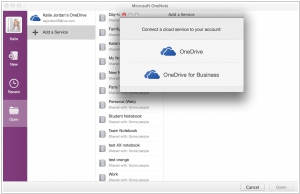
Microsoft has unveiled the initial public release of OneDrive for Business for Mac, enabling Mac users to perform the same tasks while accessing and utilizing their OneDrive files through the Mac Finder. Additionally, they can effortlessly handle and synchronize files, similar to the functionality provided by the existing Windows application. Notably, the OneDrive for Business client for Mac empowers users to access and use their files offline, eliminating the need for an internet connection. Moreover, the iOS mobile app grants users the convenience of accessing both their OneDrive for Business and OneDrive consumer accounts within a single app.
2014. Office 365 gets unlimited OneDrive storage.
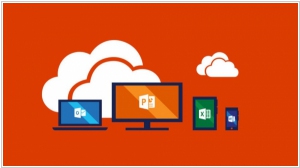
Starting today, customers of Office 365 Home, Personal, and University subscriptions will enjoy an increased storage capacity. Business customers will also receive unlimited storage in the near future, but for now, they have access to 1 TB of storage per user. With OneDrive, you can conveniently access your content across all your devices, collaborate on documents, and easily share files. While Google Drive, Box, Dropbox, and other cloud storage services have limitations on their storage capacities, OneDrive offers a significant advantage. If you reach the storage limit on those platforms, you have to purchase additional storage. Bitcasa, which was one of the few providers offering unlimited storage, recently discontinued that feature, giving Microsoft a substantial edge in terms of storage capabilities.
2014. OneDrive unifies access to business and personal files
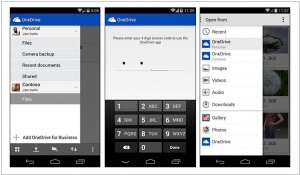
Microsoft's OneDrive is introducing enhanced functionality for mobile users, allowing them to conveniently access both business and personal files from their personal and work accounts. The application will intelligently differentiate between the two accounts, preventing any potential confusion, while still enabling users to view and back up files to both accounts. Additionally, Microsoft is implementing an additional layer of security by incorporating the option to set a four-digit PIN. This PIN can be utilized to restrict access to individual files or the entire app, bolstering overall data protection. These new features will be available in the Android app starting next week, with updates for the iOS and Windows Phone apps expected to roll out in the coming months.
2014. Microsoft OneDrive gives 15 Gb for free
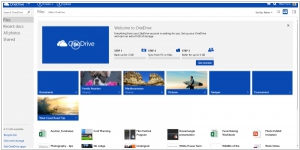
Microsoft has increased the amount of free cloud storage available in OneDrive to 15GB, a significant upgrade from the previous 7GB. For users requiring additional storage capacity, there is now an option to pay $1.99 per month for 100 gigabytes. Furthermore, Microsoft has announced that all Office 365 customers will receive 1TB of free storage. For instance, Office 365 Personal, priced at $6.99 per month, now includes nearly unlimited storage. When comparing these offerings to competitors, Google Drive provides 25GB for free and offers similar pricing structures, charging $1.99 per month for 100GB and $9.99 for 1TB. Apple grants 5GB for free and charges $0.99 per month for 20GB. Although there is no 100GB option, the rate for 200GB matches OneDrive's pricing at $3.99. Amazon Cloud Drive offers 5GB for free and provides 100GB for $4.1 per month. Therefore, while the price reduction by OneDrive may not significantly impact industry giants, it adds further pressure to third-party services such as Dropbox and Box.
2014. Microsoft renames SkyDrive to OneDrive
Microsoft has a penchant for renaming its applications and services, and the cloud storage and file sync service SkyDrive is no exception. Over the years, it has undergone various name changes, such as FolderShare, Windows Live Office, and Live Mesh. However, this upcoming name change is not merely a result of marketers fulfilling their job responsibilities. Rather, it stems from a legal dispute that was resolved last August when the British broadcasting company BSkyB successfully claimed ownership of the name "SkyDrive" from Microsoft. As a result, SkyDrive will soon (Microsoft has not provided an exact timeline) be rebranded as OneDrive, and the business version known as SkyDrive Pro, which is available to Office 365 and SharePoint 2013 users, will be known as OneDrive for Business. Currently, you can visit the OneDrive promo site where you have the option to provide your email address to Microsoft's marketing team.
2012. Microsoft launched SkyDrive for Android
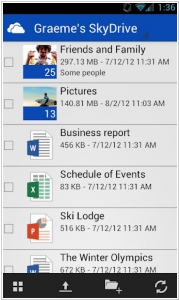
Earlier this month, Microsoft introduced a major update to its online file storage and sharing service, SkyDrive, implementing the Metro-Windows-8 interface. Today, the company has taken a step further by launching the mobile SkyDrive app for Android. This app allows Android smartphone and tablet users to access their files, including shared files, view and edit them using other applications, and seamlessly upload new and edited files back to the server. It's worth noting that SkyDrive's mobile application is also available for iPhone/iPad and Windows Phone users. Furthermore, SkyDrive comes pre-installed in Windows 8 by default. As a reminder, SkyDrive competes with services like Dropbox, Google Drive, and SugarSync, offering a generous 7 GB of free cloud storage, surpassing that of its competitors.
2012. New Office Web Apps add mobile touch interface, real-time collaboration
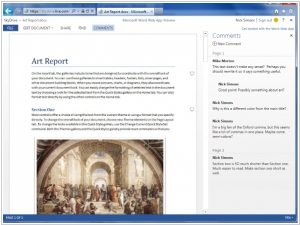
Microsoft started preview testing of the new version of its browser-based document editing applications Office Web Apps. Everybody can already join the preview on the SkyDrive or Office 365. The first thing that has changed - is the interface. It's now exactly like the upcoming Office 2013. And the main feature of this interface - is its adaption to the tablets with touch-screen. In general, the main objective pursued by Microsoft in this update - is to improve the performance of Office Web Apps on mobile devices (in mobile browsers). And the new mobile web interface for smartphones, is perhaps even better than its main competitor - Google Docs: ***

